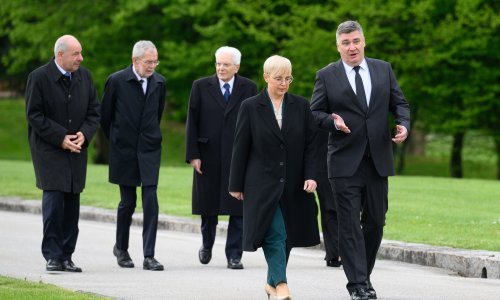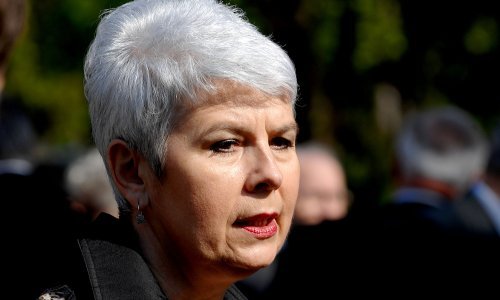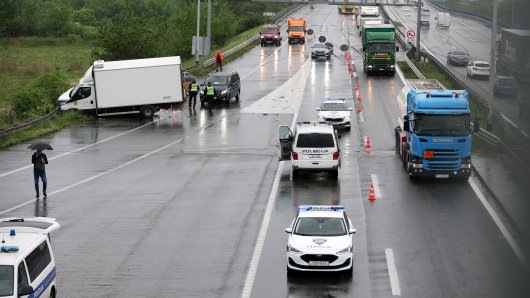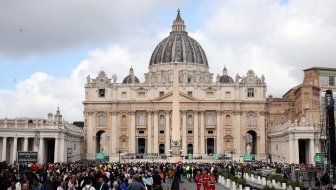The wording of a pleading that Slovenia is to submit to an international arbitration tribunal in charge of determining the course of the border-line at sea and on land between Slovenia and Croatia, will be put on the agenda of parliament after the cabinet of Prime Minister Janez Jansa on Friday decided that a decision on the matter should rest with the national law-making body.
Croatia and Slovenia are expected to submit their first depositions to the five-member Arbitral Tribunal on 11 February 2013.
The Slovenian parliament is now expected to discuss the Slovenian document at its extraordinary session behind closed doors on Monday, PM Jansa told a press conference on Friday after a regular meeting of his cabinet.
Jansa, however, ruled out the possibility of Slovenia asking for a postponement of the above mentioned deadline, after proposals of that kind were hear in the public following disagreement between Jansa and Foreign Minister Karl Erjavec on the wording of the Slovenian document.
The premier believes that the parliament would accede to "minor modifications" of the draft proposal of Slovenia's pleading on how to approach the border demarcation. The draft proposal was elaborated by the foreign ministry and a group of international experts hired by Slovenia for this task,
According to Jansa, the reason to shift the decision-making to the parliament was formal, given that in one of its declarations a few years ago, the Slovenian parliament stated that in 1991 Slovenia "conducted jurisdiction" south of the Dragonja River in the Istrian peninsula and south of the town of Sveti Martin na Muri as well as that the whole of Piran Bay belonged to Slovenia which meant that it had access to the high seas.
Therefore the Slovenian PM is in favour of the parliament deciding on incorporating "more ambitious claims" from Ljubljana.
The five-member Arbitral Tribunal was constituted pursuant to the November 2009 Croatia-Slovenia Arbitration Agreement, and according to the web site of the Hague-based Permanent Court of Arbitration, "at the first procedural meeting (on 13 April 2012) the Arbitral Tribunal and the parties discussed the procedural framework for the arbitration. According to the proposal by the parties, the Arbitral Tribunal accepted a calendar for pleadings pursuant to which the parties’ first memorials would be simultaneously submitted on 11 February 2013, the parties’ counter-memorials would be simultaneously submitted on 11 November 2013, and a hearing would be held in the spring of 2014."
Thus, a ruling of the Arbitral Tribunal on the border dispute should not be expected before the end of 2014 and early 2015. Its verdict will be final and the countries will have to abide by it.
According to the press release which the Permanent Court of Arbitration issued after the first procedural meeting in April 2012, the Arbitral Tribunal "shall determine (a) the course of the maritime and land boundary between the Republic of Slovenia and the Republic of Croatia; (b) Slovenia’s junction to the High Sea; (c) the regime for the use of the relevant maritime areas."
The tribunal should be guided by the rules and principles of international law, equity and the principle of good neighbourly relations in order "to achieve a fair and just result by taking into account all relevant circumstances".
The Arbitral Tribunal, which was constituted in 2012, is chaired by Judge Gilbert Guillaume of France, former President of the International Court of Justice. The other members are Professor Vaughan Lowe of the United Kingdom and Judge Bruno Simma of Germany. The Croatian government appointed international law expert Budislav Vukas as Croatia's representative in the Tribunal, and Slovenia's representative is Jernej Sekolec. The Permanent Court of Arbitration acts as Registry in the arbitration by agreement of the Parties.
The border arbitration agreement was signed by the two countries' prime ministers, Jadranka Kosor of Croatia and Borut Pahor of Slovenia on 4 November 2009 in Stockholm.
The document was ratified by a two-thirds majority in the Croatian parliament and was supported by 51.54 per cent of Slovenians who went to the polls for a referendum on the matter.
The treaty went into force on 29 November 2010.




































